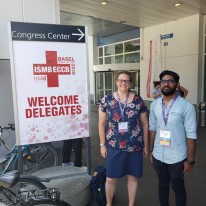Thanksgiving break is quickly approaching, and it’s amazing how time flies — that goal of writing a blog post once a week? Try once a semester!
Luckily, there has been one major theme since I’ve started teaching again – conference travel. Undergraduate travel to conferences are a major part of my NSF grant, and I’ve also been making rounds on the conference circuit presenting work students and I conducted during my sabbatical last year.
ISMB/ECCB in Basel, Switzerland. I’ve already talked about the heat wave & the wickelfisch, and I mentioned Ananthan Nambiar’s poster on NLP-based methods for protein family classification. I also presented a poster on pathway connectivity with hypergraphs that has since been published in PLOS Computational Biology. Ananthan was also featured in Reed Magazine’s annual “What is a Reedie?”
Pacific Northwest Quantitative Biology (PacNoW QB) Symposium at OHSU in Portland, OR. This one-day symposium focuses on quantitative and computational biology efforts in Oregon and Washington, encompassing different types of institutions and programs. Tunc Kose and Jiarong Li presented a poster on pathway reconstruction. (They also presented at the Pre-Inauguration Showcase at Reed College in honor of our new president Audrey Bilger).
ACM Conference on Bioinformatics, Computational Biology, and Health Informatics (BCB) in Niagara Falls, NY. I was excited to meet the eight undergraduates from the New York area who received travel funds to attend ACM-BCB as part of my NSF grant. The students came from institutions large and small, and got to learn a bit about computational biology. My student Amy Rose Lazarte, who now works at Puppet, also presented a poster on her senior thesis research.
Murdock College Science Research Conference, Vancouver, WA. Tayla Isensee, who was co-advised by Kara Cerveny, presented a poster at the annual conference organized by the Murdock Charitable Trust that celebrates undergraduate research. She also presented at the Pre-Inauguration Showcase earlier in the semester.
IEEE Conference on Bioinformatics and BioMedicine (BIBM) in San Diego, CA. Finally, my upper-level Computational Systems Biology course just returned from sunny San Diego after attending part of BIBM. I presented a workshop paper based on Alex King’s thesis and post-bac work, which should be out soon as an IEEE proceedings. Remarkably, all ten students and I managed the travel with no large holdups!
Many of my summer students also presented posters at the Reed College Poster Session early in the semester (including Karl Young, Jiarong Li, Tunc Kose, and Tayla Isensee), which highlighted computational biology at Reed. I’m looking forward to continuing the tradition of conference attendance and presentations of Reed student work!










